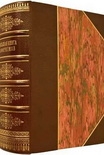Loverly:The Life and Times of My Fair Lady (Broadway Legacies) by McHugh, Dominic (best ereader for pc .TXT) 📗

Book online «Loverly:The Life and Times of My Fair Lady (Broadway Legacies) by McHugh, Dominic (best ereader for pc .TXT) 📗». Author McHugh, Dominic
Ex. 4.8. “Come to the Ball,” beginning.
Ex. 4.9. “Come to the Ball,” interlude.
The song’s lyric shows an unusual side of Higgins’s personality. We are used to him insulting and patronizing Eliza, declaring that she has “no feelings that we need worry about,” telling Mrs. Pearce to “put her in the dustbin,” and calling her a “draggle-tailed guttersnipe.”24 The only exception is in act 1, scene 3, when Eliza is on the brink of leaving before the experiment has even started and Higgins tempts her with “chocolates, and taxis, and gold, and diamonds.”25 But otherwise, the language employed in “Come to the Ball” is more overtly seductive than Higgins’s normal mode of expression. He conjures up for Eliza various images of the men who await her at the ball—a dashing marquis and a bored lord—and says “it wouldn’t be fair … to deny them all the dreams you’ll provide them.” For instance, the song begins:
Come to the ball! Come to the ball!
It wouldn’t be fair to the men who are there
To deny them
All the dreams you’ll supply them.
There even may be a dashing marquis
Who feature by feature will swear you’re the creature
He always prayed for,
Single stayed for.
If you aren’t there, his complete despair
Would be painful to see
So come to the ball, come to the ball
Come to the ball, come to the ball
With me.
Higgins seduces Eliza with romantic images of handsome suitors, though tantalizingly the choruses end with the phrase “Come to the ball with me.” Did Lerner mean to convey a sense of the union between Eliza and Higgins by promoting the image of her accompanying him to the ball? There is no doubt that by removing the song, the ambiguity of the relationship between these two characters was more successfully balanced. The third verse is too flagrant a self-portrait of Higgins and his feelings for Eliza to be mistaken: it refers to a “man with a smile you could see for a mile,” clearly meant to be Higgins himself. Further images of “the pride in his eyes” and “his dimensions expanding,” and particularly the idea that Eliza’s triumph will make him the proudest man in the world, generate a romantic intensity between the two characters, which is alien to their behavior elsewhere in the musical.
Apart from the issue of length and the problems with the depiction of romance, two other explanations for the cut are also possible. Perhaps Lerner felt there was an unintentional clash between Higgins’s promise that he would be proud of Eliza if she triumphed and the events of the opening scene of act 2, when he declares that it is his triumph, not hers. Or, similarly, perhaps he felt this sequence of events would make Higgins’s rejection of Eliza all the harsher and demonize him to a degree that made him too unsympathetic. Aside from this, it is also true that parts of the lyric are less effective than they could be. The stanza beginning “There even may be a dashing marquis…” becomes anemic toward the end, because the combination of the lines “He always prayed for” and “Single stayed for” is merely a repetition of the same (unimportant) word “for,” rather than a rhyme to match those in the other stanzas. Additionally, it blurs a clause which is written as normal (“He always prayed for”) with one whose words Lerner had to swap around for the sake of meter and poetry (a weak, feminine rhyme) rather than common sense (“Single stayed for” instead of “Stayed single for”). A subsequent image of a lord who is “frantically bored” and becomes “an Indian lancer” because of Eliza’s failure to attend is bizarre—why would this peculiar individual motivate her to come to the ball? Farther on, a line about ladies’ teeth “gnashing” is oxymoronic—a true lady would never do that—and the rhyming image of monocles “crashing” also fails to connect us with reality (how could a single lens make as loud a noise as a “crash”?). These sorts of small anomalies are probably one reason why the song failed to make an impact on the first night audience in New Haven.
Yet the middle section of the song gives us important clues about the original structure of the show and casts one of its most famous numbers in an entirely new light. Bars 76–108 are musically similar to part of the central section of “I’ve Grown Accustomed to Her Face,” in which Higgins imagines how Eliza’s life could collapse without him (“I can see her now: Missus Freddy Eynsford-Hill, in a wretched little flat above a store” and so on; see ex. 4.9). The only difference is that “Come to the Ball” does not dwell on this material for the same length of time: it omits the minor-key passage of this part of “Accustomed to Her Face.” Had “Come to the Ball” not been cut from the show, the effect of this section of “Accustomed” would have been completely different. Instead of merely providing new, contrasting material to the lyrical feel of the main part of the song, the “I can see her now” section would have been a reprise of the “Come to the Ball” interlude but with a reversal of sentiment. In place of the flattering lines “I can see you now in a gown by Madame Worth





Comments (0)